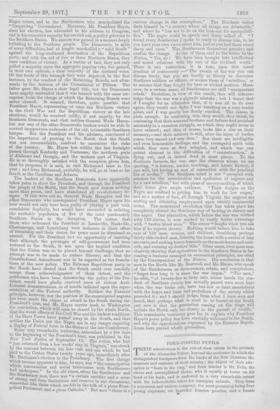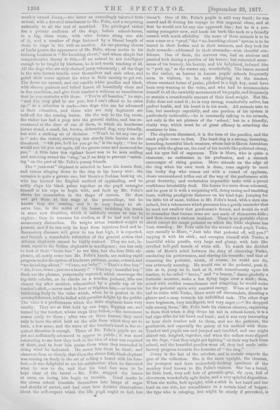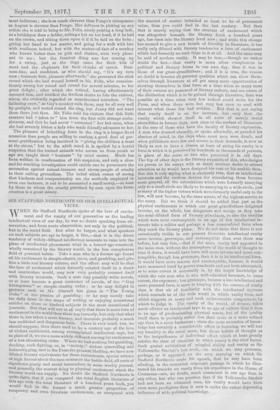FOUR-FOOTED PUPILS.
THEIR school-room is the out-of-door circus in the grounds of the Alexandra Palace, beyond the enclosure in which the distinguished foreigners from the banks of the Nile illustrate the manners and customs of their country ; the object of their edu- cation is "feats in the ring," and their teacher is Mr. Felix, the clever and accomplished clown, who is equally at home on his head or his heels, and is endowed to a very remarkable extent with the indescribable talent for managing animals. They form a numerous and various company, the most promising being four young elephants, six beautiful Russian poodles, and a female monkyy named Jenny,—the latter an exceedingly talented little animal, with a devoted attachment to Mr. Felix, and a surprising animosity to all the rest of mankind. The privileged visitor has a private audience of the dogs, before school-hours, in a big, clean room, with wire houses along one side of it, and a number of dogs fastened by a liberal length of chain to rings in the wall on another. An ear-piercing chorus of barks greets the appearance of Mr. relix, whose motto in his training business is "No knocking about," and whose simple but comprehensive theory is this,—If an animal be not intelligent enough to be taught by kindness, be is not worth teaching at all. All the dogs who are only chained jump vehemently ; all the dogs in the wire houses tumble over themselves and each other, and grind their noses against the wires in their anxiety to get out. The doors are opened, and out tumble white poodles and black, with shaven quarters and tufted knees, all beautifully clean and in fine condition, and give their teacher a welcome so tumultuous that he remonstrates with them. "You're all beauties," he says, "and I'm very glad to see you, but I can't afford to be eaten up ;" so a selection is made—two dogs who are far advanced in their education, and three who are only beginners are told-off for the coming lesson. On the way to the big room, the visitor has bad a peep into the general stables, and has en- countered at the door of one of them, in which six handsome horses stand, a small, fat, brown, determined dog, very friendly, but with a striking air of decision. "Won't he let any one go in ?" asks the visitor, surveying this sturdy little barrier on the threshold. " Oh yes, he'll let you go in," is the reply ; "but he would not let you out again, till the groom came and answered for you." A little later this vigilant beast was to be seen sniffing and watching round the "ring," as if on duty to prevent " mach- ing " on the part of Mr. Felix's young friends.
The " juniorest" elephant is selected to have his lesson first, and comes slinging down to the ring in his heavy trot ; the occasion is quite a private one, but there's a Nubian looking on, who has learned the English method of applauding, and he softly claps his black palms together as the pupil entangles himself in his rope to begin with, and feels up Mr. Felix's sleeve for consolation in the shape of carrots. He does not get them at this stage of the proceedings, but he knows they are coming, and it is very funny to ob- serve him, in the midst of Ms lesson, twitching his trunk in some new direction, which it suddenly occurs to him to explore ; then he resumes his studies, as if he had not had a momentary distraction. Ile weighs seven hundred-weight at present, and if he can only be kept from injurious food and in- flammatory diseases, will grow to ten feet high, it is expected, and furnish a remarkable refutation of the general notion that African elephants cannot be highly trained. They aro not, in- deed, equal to the Indian elephants in intelligence ; one has only to look at their " brain-box" to see that, but the four little ele- phants, all newly come into Mr. Felix's hands, are making rapid progress under the system of kindness, patience, praise, reward, and "no knocking-about." "Come, my baby!" "That's a fine boy!" fl Ah, brave, brave ; you are a beauty I" "Fine boy beautiful boy." Such are the phrases, perpetually repeated, which encourage the big-little scholar, as he climbs on a wooden pedestal, lifts one clumsy leg after another, admonished by a gentle tap of his teacher's stick,—never used to hurt or frighten him,—or turns his lumbering body in the valse which, when he is perfect in the accomplishment, will be hailed with peculiar delight by the public. The valse is a performance which the little elephants learn very readily. They are at first held by one huge, flapping ear, and turned by the teacher, whose steps they follow,—the movement comes easily to them ; after two or three lessons, they need only to have the stick held on the side from which they are to turn, a few more, and the wave of the teacher's hand in the re- quired direction is enough. Three of Mr. Felix's pupils are as yet not sufficiently advanced to appear in public ; it was most interesting to see how they took in the idea of what was required of them, and to hear him praise them when they succeeded in doing what he indicated. He never lets them be tired ; and observes them so closely, that v;hen the clever little black elephant was coming on finely in the art of rolling a barrel with his fore- feet,—it was delightful to see his satisfaction when he discerned what he was to do, and that his hind feet were to be
kept clear of the barrel Mr. Felix stopped the lesson at once, on seeing him begin to tremble. Good marks in the circus school translate themselves into lumps of sugar and chunks of carrot, and bad ones into derisive observations about the self-respect which the idlo pupil ought to 4(2.1, but, doesn't. One of Mr. Felix's pupils is still very timid ; he was scared and ill during his voyage to this ungenial clime, and at first he would not let any one approach him ; but he is a pro- mising youngster now, and lends his bark-like neck to a friendly scratch with much affability. On none of these animals is to be seen a scar or a "prod," the " no-knocking-about " system is to be traced in their bodies and in their manners, and they look for their rewards— addressed to their stomachs—with cheerful con- fidence. One of them, the nervous one, had an anxious and puzzled look during a portion of his lesson ; but reiterated assur- ances of his bravery, his beauty, and his babyhood, induced him to "perk up," as the nurses say, wonderfully. The lesson seemed to the visitor, as lessons in human pupils' schools frequently seem to visitors, to be very fatiguing to the teacher, whose constant terms of praise, pitched in a high key, must have been very wearing to the voice, and who had to accommodate himself to all the unwieldy movements of his pupils, and frequently to sustain a considerable amount of their dead-weight. But Mr. Felix does not mind it ; he is very strong, wonderfully active, has perfect health, and his heart is in his work. All animals take to him, but monkeys especially, and one portion of his system is particularly noticeable,—he is constantly talking to his animals, not only in the set phrases of the 'school,' but in a friendly, chatty way, which must be of great efficacy in attaching the creatures to him.
The elephants dismissed, it is the turn of the poodles, and the crack pupils come in first. The head-dog is a strong, bouncing, bounding, beautiful black creature, whose hair is like an Astrakhan tippet with the gloss on, the roof of his mouth like polished ebony, and his eyes full of eagerness. This is Moro, who is quite a character, an enthusiast in his profession, and a staunch encourager of rising genius. Moro attends on the edge of the ring when his own work is done, runs eagerly to meet the lucky dog who comes out with a round of applause, clears unconsidered trifles out of the way of the performers with great dexterity, and undertakes impossible tasks with a proud confidence irresistibly droll. His lesson is a mere dress-rehearsal, and he goes at it with a surprisingwill, doing racing and tumbling feats, walking prodigious distances on his hind-legs, jumping for his little bit of meat, hidden in Mr. Felix's hand, with a sure aim indeed, but a vehemence which procures him a gentle reminder that he need not swallow that gentleman's thumb, and would do well to remember that human arms are not made of rhinoceros-hide ; and then occurs a curious incident. There is no portable object about except the rough pedestal on which the little elephant has been standing ; Mr. Felix calls for the second crack pupil, Turko, says casually to Moro, "Just take that pedestal off, will you?" tapping it with his stick ; and occupies himself with Turko, a beautiful white poodle, very largo and glossy, with hair like ravelled bell-pull tassels of white silk. To watch the divided state of Moro's mind between the duty of observing Turko, emulating his performance, and sharing his rewards ; and that of removing the pedestal, which, of course, he could not do, was extremely amusing. He would run at the pedestal, push it, bite at it, jump on it, bark at it, rush tumultuously upon his teacher, to be called " brave," and "a beauty," dance gleefully a fantastic measure, make a few flying leaps over a stick ; then, seized with sudden remembrance and misgiving, he would make for the pedestal again with renewed energy. When at length he had to retire with Turko, Moro wont off disconsolate, directing a glance and a snap towards his unfulfilled task. The other dogs were beginners, very intelligent, and very eager ;—" No dropped tails among them," Mr. Felix bade his visitors observe, explaining to them that when a dog drops his tail in school-hottrs, it is a bad sign alike for his heart and head ; and it was very interesting to hear their teacher talk to them, and see the patience, the gentleness, and especially the gaiety of his method with them. Teacher and pupils ran and jumped and tumbled, and one might almost say, laughed, together, and when the collars were slipped on the dogs, "lest they might get fighting" on their way back from school, and the beautiful poodles went off, they had made satis- factory progress towards the honours of "the ring."
Jenny is the last of the scholars, and in certain respects the gem of the collection. She is the most upright, the cleanest, the youngest and least melancholy-looking specimen of the monkey kind known to Mr. Felix's visitors. She has a broad, fat little back, very soft hair of greenish-grey, sly eyes, full of cleverness, wonderfully agile limbs, and a very spiteful disposition. When she walks, bolt upright, with a stick in her hand and her bead on one side, her resemblance to a certain kind of beggar, the type who is cringing, but might be sturdy if provoked, is most ludicrous ; she is as much cleverer than Pongo's chimpanzee as August is cleverer than Pongo. Her deftness in picking up any article she is told to bring to Mr. Felix, nicely poising a long lath, as a bricklayer does a ladder, setting a hat on her head, if it be laid on the crown, and sitting down upon it if it be laid on the brim ; giving her hand to her master, and going for a walk with him with readiness indeed, but with the matter-of-fact of a monkey who knows better than to grin and chatter, were very pleas- ant to see ; but the funniest thing was her coming up for a swing, just as the dogs came for their bits of ineat and the elephants for their chunks of carrot. Busi- ness-like, and confident, as who should say, "It's my turn now ; business first, pleasure afterwards," she presented the stick anund which she had wound herself to Mr. Felix, who conscien- tiously swung her round and round for several minutes, to her great delight ; after which she retired, having affectionately caressed him, and testified the liveliest desire to bite the visitors, whom she evidently regarded as unauthorised intruders. "The imitating crew," as Gay's monkey calls them, may be all very well by gaslight, and seated round the ring, but Jenny did not want them there just then. Mr. Felix told his visitors that this little creature had "taken to" him from the first with strange exclu- siveness, and that lie had never " corrected " her but once, when she had severely bitten a lady who made friendly advances to her. The pleasure of beholding feats in the ring is a longer-lived sensation than people are willing to confess, a good deal of per- Bona' gratification being involved in "giving the children a treat at the circus," but to the adult mind it is spoiled by a horrid suspicion that the trained animals who amuse us from youth to age are taught their " business " by cruel means. Much has been written in confirmation of this suspicion, and only a close and far-reaching investigation could entitle one to pronounce the accusation against animal-trainers and circus-people of cruelty in. their calling groundless. The belief which comes of seeing that kindness and companionship are the methods employed in even one instance, is not to be accounted a small mercy,—at least by those to whom the cruelty practised by men upon the brute creation is a great misery.




































 Previous page
Previous page